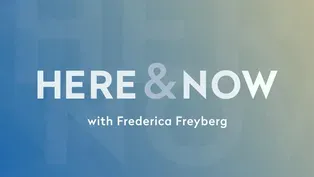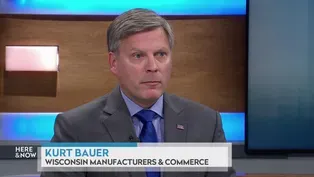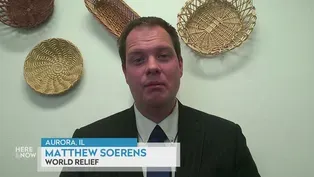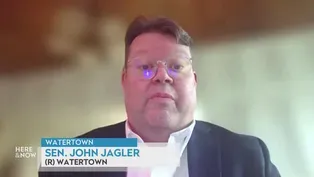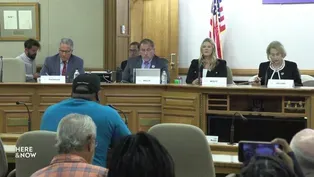Here and Now
Brad Schimel on the 2025 Wisconsin Supreme Court Race
Clip: Season 2300 Episode 2330 | 8m 17sVideo has Closed Captions
Brad Schimel on the Wisconsin Supreme Court and his perspectives on law and politics.
Waukesha County Circuit Judge Brad Schimel, a former state attorney general and conservative running for an open seat on the Wisconsin Supreme Court, discusses his perspectives on law and politics.
Here and Now
Brad Schimel on the 2025 Wisconsin Supreme Court Race
Clip: Season 2300 Episode 2330 | 8m 17sVideo has Closed Captions
Waukesha County Circuit Judge Brad Schimel, a former state attorney general and conservative running for an open seat on the Wisconsin Supreme Court, discusses his perspectives on law and politics.
How to Watch Here and Now
Here and Now is available to stream on pbs.org and the free PBS App, available on iPhone, Apple TV, Android TV, Android smartphones, Amazon Fire TV, Amazon Fire Tablet, Roku, Samsung Smart TV, and Vizio.
Providing Support for PBS.org
Learn Moreabout PBS online sponsorship>> We are less than 60 days away from the election that will determine the balance of power on the Wisconsin Supreme Court.
We plan on bringing you continuous coverage of this important race between now and the election on April 1st.
Tonight, we'll introduce you to the conservative in this race, Brad Schimel.
Schimel is currently a Waukesha County Circuit Court judge, but has previously served as the Wisconsin Attorney General.
And before that, he was the Waukesha County District Attorney.
Here and now, senior political reporter Zach Schultz sat down with Brad Schimel at a diner in Waukesha.
>> Let's start with your judicial philosophy.
Can you explain how you approach things from the bench?
You know.
>> Officially in the legal world, we say that a person with my philosophy is an originalist, meaning you go, you go back to how the Constitution was written at the time with the intent of the founders when they wrote it.
That's that's complicated language.
I'll tell you that.
My philosophy basically is, is that I approach my role as a judge with great humility.
I respect the separation of powers that the legislature sets the laws, not the judge.
I approach it with humility, 2 toward the litigants that appear in front of my court.
I respect that they are entitled to their day in court, that they are entitled to have somebody that's going to listen to them all the way till the end of the case.
Before I go deciding or making up my mind on things.
So those are those I think that wraps up my judicial philosophy, how I view this.
>> So how do you approach something like precedent?
Because obviously in federal and state cases, we've seen a lot of precedents being overturned in recent years.
>> Well, as the circuit court judge, I respect precedent.
I don't have the authority to decide.
The Supreme Court got it wrong on a case.
As a Supreme Court justice, we have to we have to overturn precedent only very rarely and very carefully.
The whole system relies on on stability that people need to be able to predict what the law says so that lawyers can advise their clients.
So everyday citizens can know what's going to keep them from getting sued for their actions, what's going to keep them out of trouble with with the police, other things.
So you have to have that stability.
So we should have great respect for precedent.
We should we should only rarely and only in extraordinary circumstances be overturning it.
>> So what do you think about the Wisconsin Supreme Court with their drop boxes decision or the redistricting decision and the most recent iteration of the court overturning those old cases?
original case from a little over two years ago now.
I read I read the decision in this case.
I did look at some of the briefing as well.
I would have sided with the dissent in the recent decision.
I, I think they got it right that the legislature created two ways to vote early absentee.
One is put it in the US mail box, which is essentially a drop box.
You know, the whole argument was that we're making it too hard for people who don't work regular jobs that don't work, that can't get to the polling place early to drop off their, their, their ballot.
You can put it in a US mail box.
And that's a secure, safe way to mail to mail in your ballot.
Or you can bring it to your clerk in person.
I think I think that the majority got it wrong on that one.
approach to precedent with the Dobbs decision?
So obviously that at the federal level was a pretty big overturning of precedent?
>> Yep.
That was a very old precedent, too.
And it was established the United States Supreme Court is the recognized that abortion isn't in the United States Constitution.
There's no reference to it anywhere.
Therefore, the decision belongs with the people, and that's where they returned it.
And it's a it can create a messy situation, I guess, where each state is going to have their own set of rules based upon what the voters in that state want.
Mississippi and California are going to have two different, very different perspectives on abortion.
But that's the way the Constitution intended it.
If it's not in the US Constitution, it belongs to the people and the states, and that's what they recognized.
That was a, you know, it had been a long time that that that the Roe decision was in place.
But the supreme state Supreme court three years ago, almost now considered that precedent and decided it was no longer it wasn't valid.
>> So in 2023, Janet Protasiewicz kind of set a new territory in terms of talking about personal values and saying those were separate from how she intended to rule or how she would rule in a case.
Did that reset the public expectations again, for what it should sound like to hear someone running for the Supreme Court?
>> I think when she said the maps are rigged, referring to the legislative redistricting maps that wasn't talking about a personal value, that was stating, that was stating a legal opinion and a judgment.
But, well, the Judicial Ethics Commission looked at it and said nothing offensive about it.
And I guess we have to live with that.
It's worth noting that decisions by the Judicial Ethics Commission are driven by the majority on the Wisconsin Supreme Court.
That means the majority on the Wisconsin Supreme Court would have wanted to punish one of their own, and they just didn't want to.
But this isn't acceptable.
Imagine this if you went to a Brewer game and you you bought your $17 beer, but you sat down and the umpire comes out, not in the Black they're supposed to wear, but a Cardinals jersey.
You're not buying another beer because this you know how this game is going to end.
The Cardinals fan in the stands might feel good about that.
For the moment, but what they're just witnessing is the death of baseball, right.
And now you can always, with baseball, move on to another sport.
If we've got people on the Supreme Court that can't set their personal opinions aside and are wearing the jersey of a team, then our justice system doesn't survive and we don't have any other sport to go to, so to speak.
It's not acceptable and just judges and candidates for office shouldn't be talking about how they're going to rule on cases, period.
>> So there's going to be people watching this are going to say, well, you're a former Republican.
You were the attorney general of Wisconsin.
As a Republican.
You've run statewide.
How is that different?
How how do you explain to them the difference between running as a partizan versus running for this?
>> Well, first off, all of my prior roles were as a prosecutor and the Waukesha DA's office, and I did I was a Da as a Republican in Waukesha County for that and attorney general as a Republican.
Both of those roles, you don't make law.
You enforce the law the way someone else made it or wrote it.
And the same thing in my role as a judge.
But I've set those things.
I've set those partizan things aside every single day on the bench.
It's worth noting my opponent also has a partisan history.
She was chief legal counsel for Governor Jim Doyle.
It doesn't get any more partisan than being in that role.
Short of being the governor, you're the next most partisan person in that office.
Both of us have partisan histories, and it's kind of fraudulent to suggest that just because I officially ran as a Republican, I'm the only one with that kind of a history.
>> So there is a history of former partisan officeholders being on the Supreme Court.
Justice Prosser was there.
He explained to me the difference between being a judicial conservative and a political conservative can.
Do you agree with his definitions?
There.
>> Absolutely.
Being a political conservative means ascribing to certain policy values as a judicial conservative.
It is a it's a philosophy like you asked me about earlier and a judicial conservative believes that the courts should be restrained when they're looking at a law.
You interpret it the way the legislature wrote it, and you don't try to change it into some other form.
The opposite is judicial activism or being a judicial liberal, where they believe that the court's role is to is to change the law into a form that they think is best.
And that's the difference between between those judicial, conservative and judicial liberal, but very different than the political conservative and the political conservative and
Here & Now opening for February 7, 2025
Video has Closed Captions
The introduction to the February 7, 2025 episode of Here & Now. (1m 5s)
Kurt Bauer on How Tariffs Could Impact Wisconsin Businesses
Video has Closed Captions
Kurt Bauer on the Trump administration's plans for tariffs on Canada, Mexico and China. (4m 51s)
Matthew Soerens on Suspending Refugee Resettlement in the US
Video has Closed Captions
Matthew Soerens on an executive order to suspend refugee resettlement and its impacts. (5m 24s)
Sen. John Jagler on Scoring Standardized Tests in Wisconsin
Video has Closed Captions
John Jagler on a bill to revert how Wisconsin scores standardized reading and math tests. (5m 50s)
Wisconsin Supreme Court Rules Meagan Wolfe May Remain at WEC
Video has Closed Captions
The Wisconsin Supreme Court ruled on Meagan Wolfe at the Wisconsin Elections Commission. (42s)
Providing Support for PBS.org
Learn Moreabout PBS online sponsorship